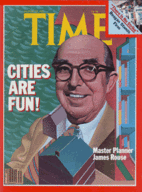James W. Rouse
|
|
James Wilson Rouse (April 26, 1914 - April 9, 1996) was a pioneering real estate developer civic activist, and later, free enterprise-based philanthropist.
He was born in Easton, Maryland. He attended college and law school during the Great Depression; after graduating in 1937 he worked for the Federal Housing Administration and in 1939 he was a partner at a mortgage banking firm called the "Moss-Rouse Company", which would eventually become the Rouse Company.
After World War II he became involved in Baltimore, Maryland's efforts to rehabilitate its slums. This led to his participation in Dwight D. Eisenhower's National Housing Task Force starting in 1953. He introduced (or at least helped popularize) the term "urban renewal" to describe the series of recommendations made by that task force.
In 1958, Rouse built Harundale Mall in Glen Burnie, Maryland, the first enclosed shopping center on the East Coast. His company coined the term "mall" to describe the development, which was an alternative to the more typical strip malls usually built in the suburbs. Although in retrospect, many attribute the rise of the shopping mall as a major contributor to the decline of the city downtown core, Rouse's focus at the time was on the introduction of malls as a form of town center for the suburbs.
In the 1960s Rouse turned his focus on planned communities; his crowning achievement during that decade was Columbia, Maryland.
Starting in the mid-1970s and continuing into the 1980s he shifted focus to what he ended up calling the "festival marketplace"; the first and most successful example was his Faneuil Hall Marketplace, adjacent to Boston's Faneuil Hall and opened in 1976. Faneuil Hall was designed by architect Benjamin C. Thompson and was a financial success, an act of historic preservation, and an anchor for urban revitalization.
Other examples of Rouse Company developments include South Street Seaport in New York City, Harborplace in Baltimore, Maryland, Waterside in Norfolk, Virginia, St. Louis Union Station in St. Louis, Missouri, Downtown Portland's Pioneer Place [1] (http://www.icsc.org/srch/sct/current/sct9901/09.htm), and the Riverwalk of New Orleans. This focus led TIME magazine to call him "the man who made cities fun again."
After forty years at the Rouse Company, he retired in 1979. Soon afterwards, he and his wife founded the Enterprise Foundation, a not-for-profit foundation funded in part by a for-profit subsidiary and focused on seeding partnerships with community developers that address the need for affordable housing and associated social services for poor neighborhoods.
He was the grandfather of actor Edward Norton.
He received the Presidential Medal of Freedom in 1995.
External links
- Remembering James Rouse (http://www.pbs.org/newshour/bb/remember/rouse_4-10.html) from the website of The NewsHour
- Spring 1988 cover story on Rouse (http://www.nbm.org/blueprints/80s/spring88/cover/cover.htm) from Blueprints magazine
- The Rouse Company's diverse portfolio (http://www.nareit.com/portfoliomag/03mayjun/feat4.shtml), a 2003 article for a REIT and real estate website
- The Enterprise Foundation website (http://www.enterprisefoundation.org/)

